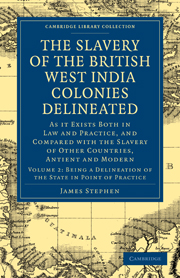 The Slavery of the British West India Colonies Delineated
The Slavery of the British West India Colonies Delineated Book contents
- Frontmatter
- PREFACE
- Contents
- BOOK II DELINEATION OF THE STATE OF SLAVERY IN OUR COLONIES, IN ITS ORDINARY PRACTICAL NATURE AND EFFECTS
- CHAPTER I REASONS FOR RESUMING THIS WORK; DEFENCE OF THE FIRST, AND PLAN OF THE SECOND VOLUME
- CHAPTER II OF AGRICULTURAL LABOUR IN THE TORRID ZONE, AND THE PERNICIOUS EFFECTS OF ITS EXCESS WHEN FORCIBLY EXACTED
- CHAPTER III THE HIGH PROBABILITY THAT THE AMOUNT OF FORCED LABOUR ON SUGAR PLANTATIONS IS OPPRESSIVELY AND DESTRUCTIVELY EXCESSIVE, DEDUCED FROM THE NATURAL TENDENCY OF THE SYSTEM; AND CONFIRMED BY THE DECLINE OF POPULATION AMONG THE PREDIAL SLAVES
- CHAPTER IV THE ACTUAL ORDINARY DETAILS AND GENERAL AMOUNT, IN POINT OF TIME, OF FORCED LABOUR ON SUGAR PLANTATIONS PARTICULARLY STATED AND PROVED; AND THE CRUEL EXCESS DEMONSTRATED
- CHAPTER V THE LABOUR SHEWN TO BE EXCESSIVE ALSO, FOR THE MOST PART, IN POINT OF INTENSITY, OR THE DEGREE OF ACTUAL EXERTION
- CHAPTER VI COMPARISON OF THE AMOUNT OF SLAVE LABOUR ON SUGAR PLANTATIONS WITH THAT OF AGRICULTURAL LABOURERS IN ENGLAND
- CHAPTER VII THE MEANS BY WHICH LABOUR IS ENFORCED ON SUGAR PLANTATIONS GREATLY AGGRAVATES ITS SEVERITY, AND ARE IN THEIR NATURE AND EFFECTS EXTREMELY CRUEL AND PERNICIOUS
- CHAPTER VIII THE MAINTENANCE OF THE PLANTATION SLAVES IS IN A VERY OPPRESSIVE AND CRUEL DEGREE PARSIMONIOUS AND INSUFFICIENT
- CHAPTER IX THE ALLOWANCES OF CLOTHING TO THE FIELD NEGROES BY THEIR OWNERS IS ALSO IN A SHAMEFUL DEGREE PENURIOUS AND INSUFFICIENT
- CHAPTER X THE SLAVES ARE VERY BADLY LODGED
- CHAPTER XI THE SLAVES ARE ALSO TREATED WITH GREAT HARSHNESS, NEGLECT, AND INHUMANITY WHEN SICK
- CHAPTER XII THE WHOLE EXPENSE OF THE MAINTENANCE OF PLANTATION SLAVES ESTIMATED AND COMPARED WITH THE COST OF FREE LABOUR
- CHAPTER XIII CONCLUDING AND PRACTICAL REFLECTIONS
- APPENDIX: CASES OF CRUELTY, INDICATING THE GENERAL PREVALENCE, IN THE SUGAR COLONIES, OF INSENSIBILITY TO THE SUFFERINGS OF SLAVES, AND AN INDISPOSITION TO RESTRAIN OR PUNISH THE AUTHORS OF SUCH OFFENCES
CHAPTER III - THE HIGH PROBABILITY THAT THE AMOUNT OF FORCED LABOUR ON SUGAR PLANTATIONS IS OPPRESSIVELY AND DESTRUCTIVELY EXCESSIVE, DEDUCED FROM THE NATURAL TENDENCY OF THE SYSTEM; AND CONFIRMED BY THE DECLINE OF POPULATION AMONG THE PREDIAL SLAVES
Published online by Cambridge University Press: 07 October 2011
- Frontmatter
- PREFACE
- Contents
- BOOK II DELINEATION OF THE STATE OF SLAVERY IN OUR COLONIES, IN ITS ORDINARY PRACTICAL NATURE AND EFFECTS
- CHAPTER I REASONS FOR RESUMING THIS WORK; DEFENCE OF THE FIRST, AND PLAN OF THE SECOND VOLUME
- CHAPTER II OF AGRICULTURAL LABOUR IN THE TORRID ZONE, AND THE PERNICIOUS EFFECTS OF ITS EXCESS WHEN FORCIBLY EXACTED
- CHAPTER III THE HIGH PROBABILITY THAT THE AMOUNT OF FORCED LABOUR ON SUGAR PLANTATIONS IS OPPRESSIVELY AND DESTRUCTIVELY EXCESSIVE, DEDUCED FROM THE NATURAL TENDENCY OF THE SYSTEM; AND CONFIRMED BY THE DECLINE OF POPULATION AMONG THE PREDIAL SLAVES
- CHAPTER IV THE ACTUAL ORDINARY DETAILS AND GENERAL AMOUNT, IN POINT OF TIME, OF FORCED LABOUR ON SUGAR PLANTATIONS PARTICULARLY STATED AND PROVED; AND THE CRUEL EXCESS DEMONSTRATED
- CHAPTER V THE LABOUR SHEWN TO BE EXCESSIVE ALSO, FOR THE MOST PART, IN POINT OF INTENSITY, OR THE DEGREE OF ACTUAL EXERTION
- CHAPTER VI COMPARISON OF THE AMOUNT OF SLAVE LABOUR ON SUGAR PLANTATIONS WITH THAT OF AGRICULTURAL LABOURERS IN ENGLAND
- CHAPTER VII THE MEANS BY WHICH LABOUR IS ENFORCED ON SUGAR PLANTATIONS GREATLY AGGRAVATES ITS SEVERITY, AND ARE IN THEIR NATURE AND EFFECTS EXTREMELY CRUEL AND PERNICIOUS
- CHAPTER VIII THE MAINTENANCE OF THE PLANTATION SLAVES IS IN A VERY OPPRESSIVE AND CRUEL DEGREE PARSIMONIOUS AND INSUFFICIENT
- CHAPTER IX THE ALLOWANCES OF CLOTHING TO THE FIELD NEGROES BY THEIR OWNERS IS ALSO IN A SHAMEFUL DEGREE PENURIOUS AND INSUFFICIENT
- CHAPTER X THE SLAVES ARE VERY BADLY LODGED
- CHAPTER XI THE SLAVES ARE ALSO TREATED WITH GREAT HARSHNESS, NEGLECT, AND INHUMANITY WHEN SICK
- CHAPTER XII THE WHOLE EXPENSE OF THE MAINTENANCE OF PLANTATION SLAVES ESTIMATED AND COMPARED WITH THE COST OF FREE LABOUR
- CHAPTER XIII CONCLUDING AND PRACTICAL REFLECTIONS
- APPENDIX: CASES OF CRUELTY, INDICATING THE GENERAL PREVALENCE, IN THE SUGAR COLONIES, OF INSENSIBILITY TO THE SUFFERINGS OF SLAVES, AND AN INDISPOSITION TO RESTRAIN OR PUNISH THE AUTHORS OF SUCH OFFENCES
Summary
Section I.—Natural Tendencies of the System.
Though the proper medium between an indolent deficiency, and a pernicious excess of exertion, cannot be certainly ascertained by any general rule, applicable to all cases and circumstances; yet where the labourers are free, experience supplies a criterion accurate enough for ordinary use. When wages are sufficiently high, and still more when there is a competition for employment, it will be known how much labourers can commonly do, consistently with self-preservation and health, by what they actually perform. Hence a customary standard has arisen between the employers and the employed. The English farmer knows by usage, and so does the labourer too, what is a fair days' work at the different seasons of the year: the one will not be content with less, and the other will yield no more. A labourer may be too feeble from age or constitution to work up to the established standard; but then he must be content to receive less than ordinary pay.
Slavery, and its forced labour, preclude that fair and safe adjustment. There may be a customary quantum of work; but as the usage has grown from the compulsion of the masters, not the volition of the slaves, we cannot infer from the generality of its performance, that it can be easily or innoxiously endured.
- Type
- Chapter
- Information
- The Slavery of the British West India Colonies DelineatedAs it Exists Both in Law and Practice, and Compared with the Slavery of Other Countries, Antient and Modern, pp. 57 - 81Publisher: Cambridge University PressPrint publication year: 2010First published in: 1830


